HRM Practices and Legislation in Deloitte's Recruitment Process Report
VerifiedAdded on 2023/01/11
|14
|4880
|70
Report
AI Summary
This report provides a detailed analysis of Human Resource Management (HRM) practices within Deloitte, a multinational professional services network. It explores the core functions of HRM, including planning, organizing, staffing, directing, and controlling, and their application in workforce planning. The report evaluates different approaches to recruitment and selection, highlighting their strengths and weaknesses, and examines the importance of employee relations and key elements of HRM legislation. Furthermore, it delves into HRM practices used to enhance organizational income and output, such as performance management, and includes a PESTLE analysis to assess the external factors influencing Deloitte's operations. The report also discusses training, reward management, and the impact of motivational theories on employee engagement and productivity, offering insights into how Deloitte manages its workforce to achieve its strategic objectives and maintain a competitive edge in the global market.
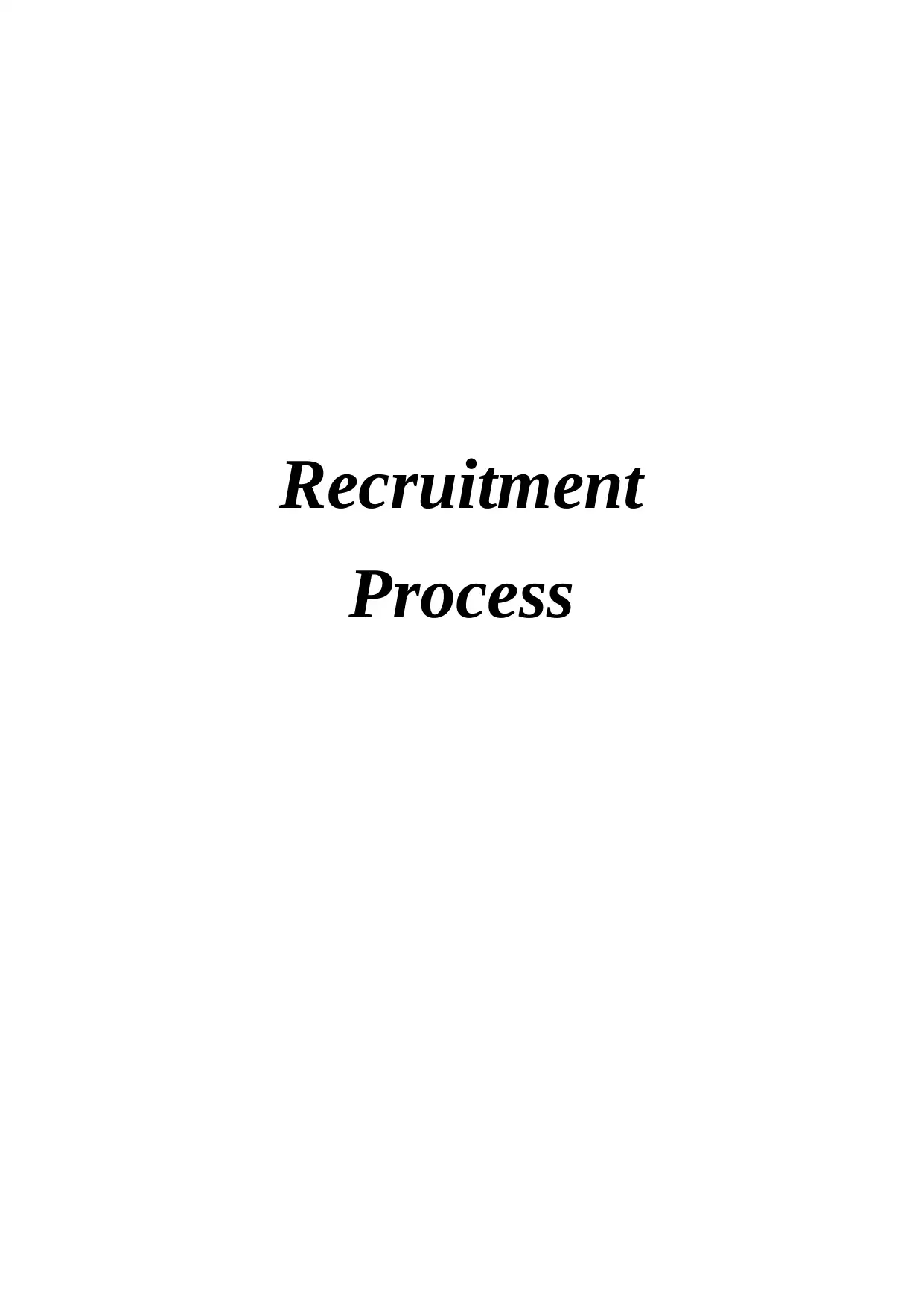
Recruitment
Process
Process
Paraphrase This Document
Need a fresh take? Get an instant paraphrase of this document with our AI Paraphraser
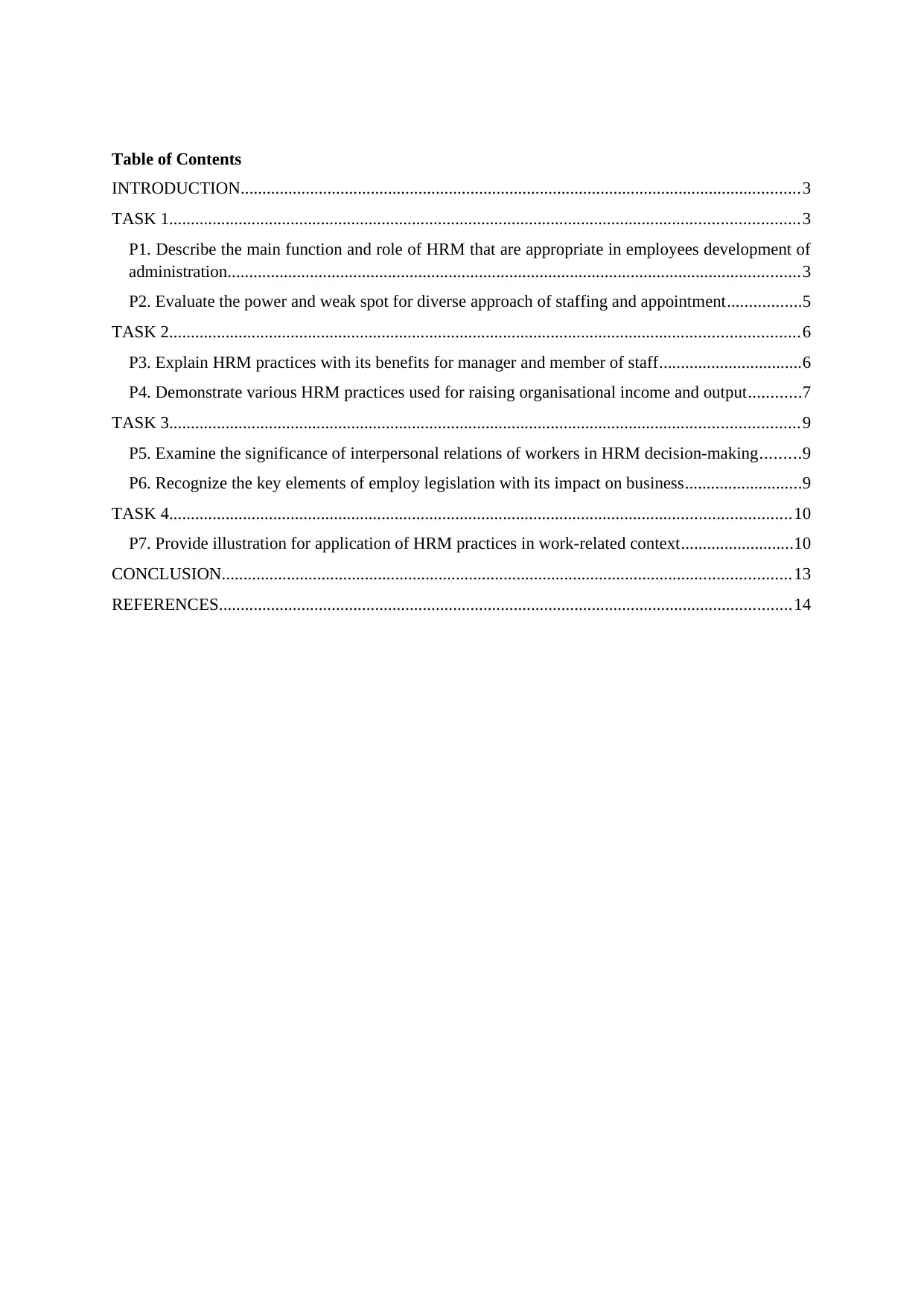
Table of Contents
INTRODUCTION.................................................................................................................................3
TASK 1.................................................................................................................................................3
P1. Describe the main function and role of HRM that are appropriate in employees development of
administration....................................................................................................................................3
P2. Evaluate the power and weak spot for diverse approach of staffing and appointment.................5
TASK 2.................................................................................................................................................6
P3. Explain HRM practices with its benefits for manager and member of staff.................................6
P4. Demonstrate various HRM practices used for raising organisational income and output............7
TASK 3.................................................................................................................................................9
P5. Examine the significance of interpersonal relations of workers in HRM decision-making.........9
P6. Recognize the key elements of employ legislation with its impact on business...........................9
TASK 4...............................................................................................................................................10
P7. Provide illustration for application of HRM practices in work-related context..........................10
CONCLUSION...................................................................................................................................13
REFERENCES....................................................................................................................................14
INTRODUCTION.................................................................................................................................3
TASK 1.................................................................................................................................................3
P1. Describe the main function and role of HRM that are appropriate in employees development of
administration....................................................................................................................................3
P2. Evaluate the power and weak spot for diverse approach of staffing and appointment.................5
TASK 2.................................................................................................................................................6
P3. Explain HRM practices with its benefits for manager and member of staff.................................6
P4. Demonstrate various HRM practices used for raising organisational income and output............7
TASK 3.................................................................................................................................................9
P5. Examine the significance of interpersonal relations of workers in HRM decision-making.........9
P6. Recognize the key elements of employ legislation with its impact on business...........................9
TASK 4...............................................................................................................................................10
P7. Provide illustration for application of HRM practices in work-related context..........................10
CONCLUSION...................................................................................................................................13
REFERENCES....................................................................................................................................14
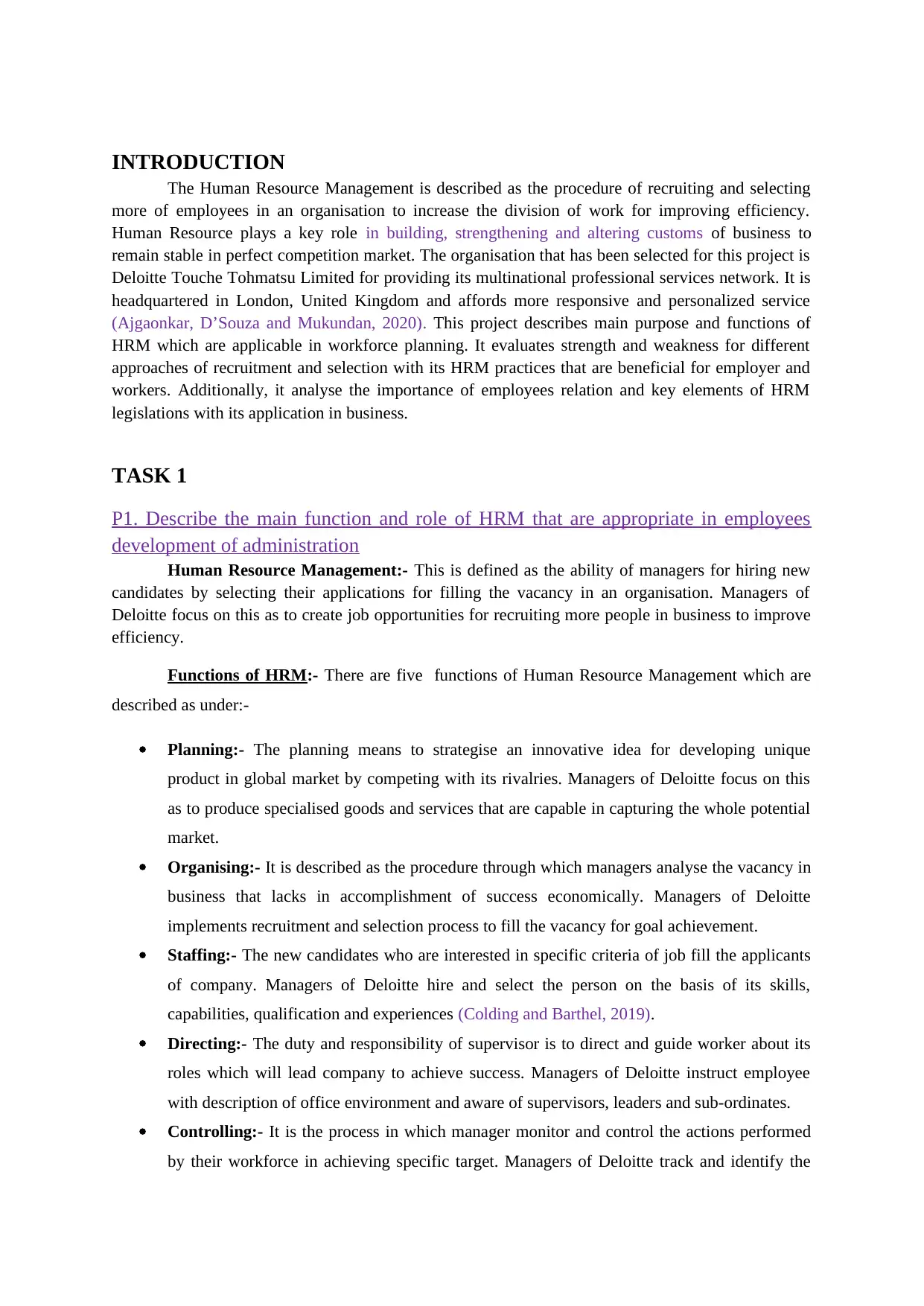
INTRODUCTION
The Human Resource Management is described as the procedure of recruiting and selecting
more of employees in an organisation to increase the division of work for improving efficiency.
Human Resource plays a key role in building, strengthening and altering customs of business to
remain stable in perfect competition market. The organisation that has been selected for this project is
Deloitte Touche Tohmatsu Limited for providing its multinational professional services network. It is
headquartered in London, United Kingdom and affords more responsive and personalized service
(Ajgaonkar, D’Souza and Mukundan, 2020). This project describes main purpose and functions of
HRM which are applicable in workforce planning. It evaluates strength and weakness for different
approaches of recruitment and selection with its HRM practices that are beneficial for employer and
workers. Additionally, it analyse the importance of employees relation and key elements of HRM
legislations with its application in business.
TASK 1
P1. Describe the main function and role of HRM that are appropriate in employees
development of administration
Human Resource Management:- This is defined as the ability of managers for hiring new
candidates by selecting their applications for filling the vacancy in an organisation. Managers of
Deloitte focus on this as to create job opportunities for recruiting more people in business to improve
efficiency.
Functions of HRM:- There are five functions of Human Resource Management which are
described as under:-
Planning:- The planning means to strategise an innovative idea for developing unique
product in global market by competing with its rivalries. Managers of Deloitte focus on this
as to produce specialised goods and services that are capable in capturing the whole potential
market.
Organising:- It is described as the procedure through which managers analyse the vacancy in
business that lacks in accomplishment of success economically. Managers of Deloitte
implements recruitment and selection process to fill the vacancy for goal achievement.
Staffing:- The new candidates who are interested in specific criteria of job fill the applicants
of company. Managers of Deloitte hire and select the person on the basis of its skills,
capabilities, qualification and experiences (Colding and Barthel, 2019).
Directing:- The duty and responsibility of supervisor is to direct and guide worker about its
roles which will lead company to achieve success. Managers of Deloitte instruct employee
with description of office environment and aware of supervisors, leaders and sub-ordinates.
Controlling:- It is the process in which manager monitor and control the actions performed
by their workforce in achieving specific target. Managers of Deloitte track and identify the
The Human Resource Management is described as the procedure of recruiting and selecting
more of employees in an organisation to increase the division of work for improving efficiency.
Human Resource plays a key role in building, strengthening and altering customs of business to
remain stable in perfect competition market. The organisation that has been selected for this project is
Deloitte Touche Tohmatsu Limited for providing its multinational professional services network. It is
headquartered in London, United Kingdom and affords more responsive and personalized service
(Ajgaonkar, D’Souza and Mukundan, 2020). This project describes main purpose and functions of
HRM which are applicable in workforce planning. It evaluates strength and weakness for different
approaches of recruitment and selection with its HRM practices that are beneficial for employer and
workers. Additionally, it analyse the importance of employees relation and key elements of HRM
legislations with its application in business.
TASK 1
P1. Describe the main function and role of HRM that are appropriate in employees
development of administration
Human Resource Management:- This is defined as the ability of managers for hiring new
candidates by selecting their applications for filling the vacancy in an organisation. Managers of
Deloitte focus on this as to create job opportunities for recruiting more people in business to improve
efficiency.
Functions of HRM:- There are five functions of Human Resource Management which are
described as under:-
Planning:- The planning means to strategise an innovative idea for developing unique
product in global market by competing with its rivalries. Managers of Deloitte focus on this
as to produce specialised goods and services that are capable in capturing the whole potential
market.
Organising:- It is described as the procedure through which managers analyse the vacancy in
business that lacks in accomplishment of success economically. Managers of Deloitte
implements recruitment and selection process to fill the vacancy for goal achievement.
Staffing:- The new candidates who are interested in specific criteria of job fill the applicants
of company. Managers of Deloitte hire and select the person on the basis of its skills,
capabilities, qualification and experiences (Colding and Barthel, 2019).
Directing:- The duty and responsibility of supervisor is to direct and guide worker about its
roles which will lead company to achieve success. Managers of Deloitte instruct employee
with description of office environment and aware of supervisors, leaders and sub-ordinates.
Controlling:- It is the process in which manager monitor and control the actions performed
by their workforce in achieving specific target. Managers of Deloitte track and identify the
⊘ This is a preview!⊘
Do you want full access?
Subscribe today to unlock all pages.

Trusted by 1+ million students worldwide
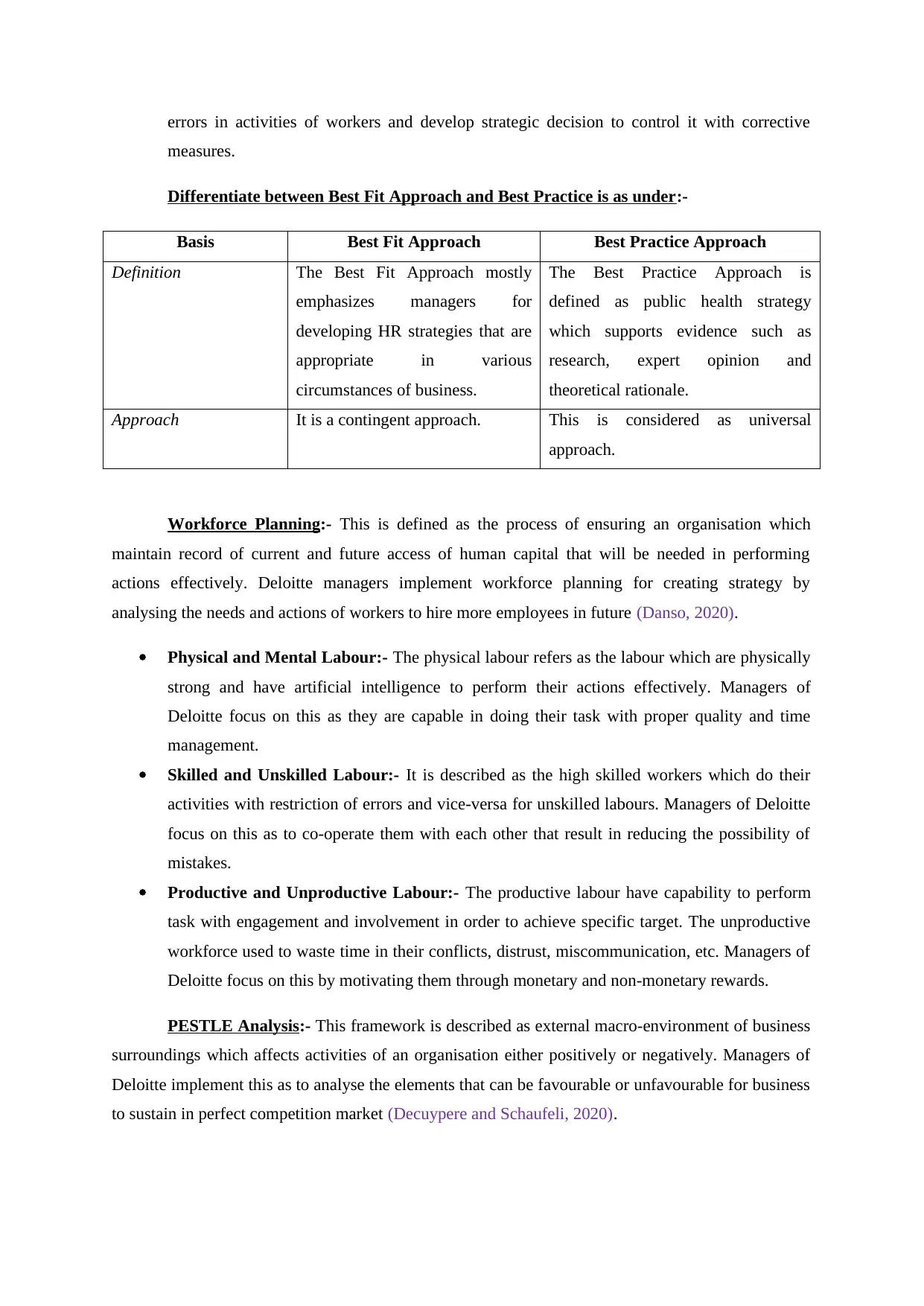
errors in activities of workers and develop strategic decision to control it with corrective
measures.
Differentiate between Best Fit Approach and Best Practice is as under:-
Basis Best Fit Approach Best Practice Approach
Definition The Best Fit Approach mostly
emphasizes managers for
developing HR strategies that are
appropriate in various
circumstances of business.
The Best Practice Approach is
defined as public health strategy
which supports evidence such as
research, expert opinion and
theoretical rationale.
Approach It is a contingent approach. This is considered as universal
approach.
Workforce Planning:- This is defined as the process of ensuring an organisation which
maintain record of current and future access of human capital that will be needed in performing
actions effectively. Deloitte managers implement workforce planning for creating strategy by
analysing the needs and actions of workers to hire more employees in future (Danso, 2020).
Physical and Mental Labour:- The physical labour refers as the labour which are physically
strong and have artificial intelligence to perform their actions effectively. Managers of
Deloitte focus on this as they are capable in doing their task with proper quality and time
management.
Skilled and Unskilled Labour:- It is described as the high skilled workers which do their
activities with restriction of errors and vice-versa for unskilled labours. Managers of Deloitte
focus on this as to co-operate them with each other that result in reducing the possibility of
mistakes.
Productive and Unproductive Labour:- The productive labour have capability to perform
task with engagement and involvement in order to achieve specific target. The unproductive
workforce used to waste time in their conflicts, distrust, miscommunication, etc. Managers of
Deloitte focus on this by motivating them through monetary and non-monetary rewards.
PESTLE Analysis:- This framework is described as external macro-environment of business
surroundings which affects activities of an organisation either positively or negatively. Managers of
Deloitte implement this as to analyse the elements that can be favourable or unfavourable for business
to sustain in perfect competition market (Decuypere and Schaufeli, 2020).
measures.
Differentiate between Best Fit Approach and Best Practice is as under:-
Basis Best Fit Approach Best Practice Approach
Definition The Best Fit Approach mostly
emphasizes managers for
developing HR strategies that are
appropriate in various
circumstances of business.
The Best Practice Approach is
defined as public health strategy
which supports evidence such as
research, expert opinion and
theoretical rationale.
Approach It is a contingent approach. This is considered as universal
approach.
Workforce Planning:- This is defined as the process of ensuring an organisation which
maintain record of current and future access of human capital that will be needed in performing
actions effectively. Deloitte managers implement workforce planning for creating strategy by
analysing the needs and actions of workers to hire more employees in future (Danso, 2020).
Physical and Mental Labour:- The physical labour refers as the labour which are physically
strong and have artificial intelligence to perform their actions effectively. Managers of
Deloitte focus on this as they are capable in doing their task with proper quality and time
management.
Skilled and Unskilled Labour:- It is described as the high skilled workers which do their
activities with restriction of errors and vice-versa for unskilled labours. Managers of Deloitte
focus on this as to co-operate them with each other that result in reducing the possibility of
mistakes.
Productive and Unproductive Labour:- The productive labour have capability to perform
task with engagement and involvement in order to achieve specific target. The unproductive
workforce used to waste time in their conflicts, distrust, miscommunication, etc. Managers of
Deloitte focus on this by motivating them through monetary and non-monetary rewards.
PESTLE Analysis:- This framework is described as external macro-environment of business
surroundings which affects activities of an organisation either positively or negatively. Managers of
Deloitte implement this as to analyse the elements that can be favourable or unfavourable for business
to sustain in perfect competition market (Decuypere and Schaufeli, 2020).
Paraphrase This Document
Need a fresh take? Get an instant paraphrase of this document with our AI Paraphraser
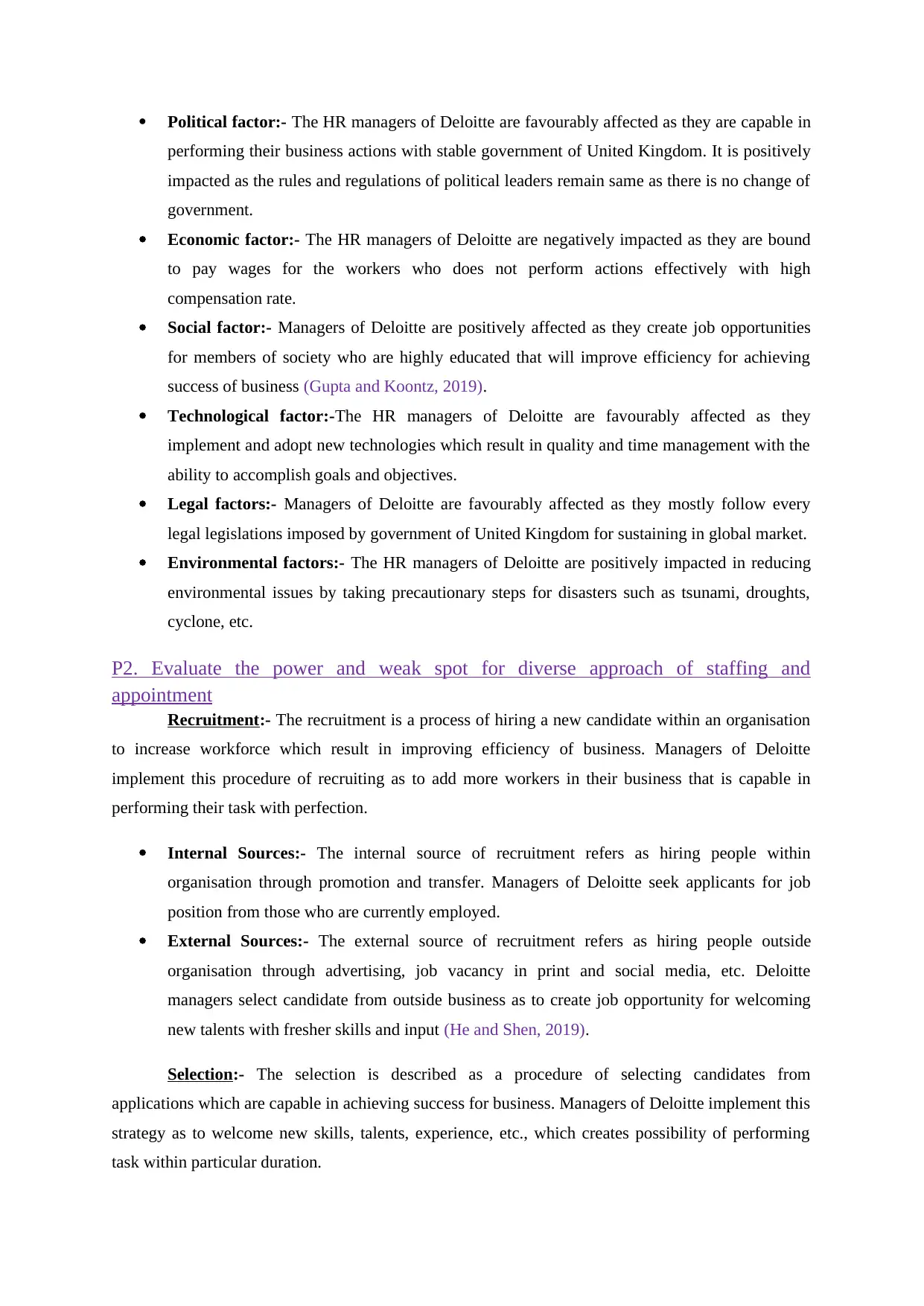
Political factor:- The HR managers of Deloitte are favourably affected as they are capable in
performing their business actions with stable government of United Kingdom. It is positively
impacted as the rules and regulations of political leaders remain same as there is no change of
government.
Economic factor:- The HR managers of Deloitte are negatively impacted as they are bound
to pay wages for the workers who does not perform actions effectively with high
compensation rate.
Social factor:- Managers of Deloitte are positively affected as they create job opportunities
for members of society who are highly educated that will improve efficiency for achieving
success of business (Gupta and Koontz, 2019).
Technological factor:-The HR managers of Deloitte are favourably affected as they
implement and adopt new technologies which result in quality and time management with the
ability to accomplish goals and objectives.
Legal factors:- Managers of Deloitte are favourably affected as they mostly follow every
legal legislations imposed by government of United Kingdom for sustaining in global market.
Environmental factors:- The HR managers of Deloitte are positively impacted in reducing
environmental issues by taking precautionary steps for disasters such as tsunami, droughts,
cyclone, etc.
P2. Evaluate the power and weak spot for diverse approach of staffing and
appointment
Recruitment:- The recruitment is a process of hiring a new candidate within an organisation
to increase workforce which result in improving efficiency of business. Managers of Deloitte
implement this procedure of recruiting as to add more workers in their business that is capable in
performing their task with perfection.
Internal Sources:- The internal source of recruitment refers as hiring people within
organisation through promotion and transfer. Managers of Deloitte seek applicants for job
position from those who are currently employed.
External Sources:- The external source of recruitment refers as hiring people outside
organisation through advertising, job vacancy in print and social media, etc. Deloitte
managers select candidate from outside business as to create job opportunity for welcoming
new talents with fresher skills and input (He and Shen, 2019).
Selection:- The selection is described as a procedure of selecting candidates from
applications which are capable in achieving success for business. Managers of Deloitte implement this
strategy as to welcome new skills, talents, experience, etc., which creates possibility of performing
task within particular duration.
performing their business actions with stable government of United Kingdom. It is positively
impacted as the rules and regulations of political leaders remain same as there is no change of
government.
Economic factor:- The HR managers of Deloitte are negatively impacted as they are bound
to pay wages for the workers who does not perform actions effectively with high
compensation rate.
Social factor:- Managers of Deloitte are positively affected as they create job opportunities
for members of society who are highly educated that will improve efficiency for achieving
success of business (Gupta and Koontz, 2019).
Technological factor:-The HR managers of Deloitte are favourably affected as they
implement and adopt new technologies which result in quality and time management with the
ability to accomplish goals and objectives.
Legal factors:- Managers of Deloitte are favourably affected as they mostly follow every
legal legislations imposed by government of United Kingdom for sustaining in global market.
Environmental factors:- The HR managers of Deloitte are positively impacted in reducing
environmental issues by taking precautionary steps for disasters such as tsunami, droughts,
cyclone, etc.
P2. Evaluate the power and weak spot for diverse approach of staffing and
appointment
Recruitment:- The recruitment is a process of hiring a new candidate within an organisation
to increase workforce which result in improving efficiency of business. Managers of Deloitte
implement this procedure of recruiting as to add more workers in their business that is capable in
performing their task with perfection.
Internal Sources:- The internal source of recruitment refers as hiring people within
organisation through promotion and transfer. Managers of Deloitte seek applicants for job
position from those who are currently employed.
External Sources:- The external source of recruitment refers as hiring people outside
organisation through advertising, job vacancy in print and social media, etc. Deloitte
managers select candidate from outside business as to create job opportunity for welcoming
new talents with fresher skills and input (He and Shen, 2019).
Selection:- The selection is described as a procedure of selecting candidates from
applications which are capable in achieving success for business. Managers of Deloitte implement this
strategy as to welcome new skills, talents, experience, etc., which creates possibility of performing
task within particular duration.
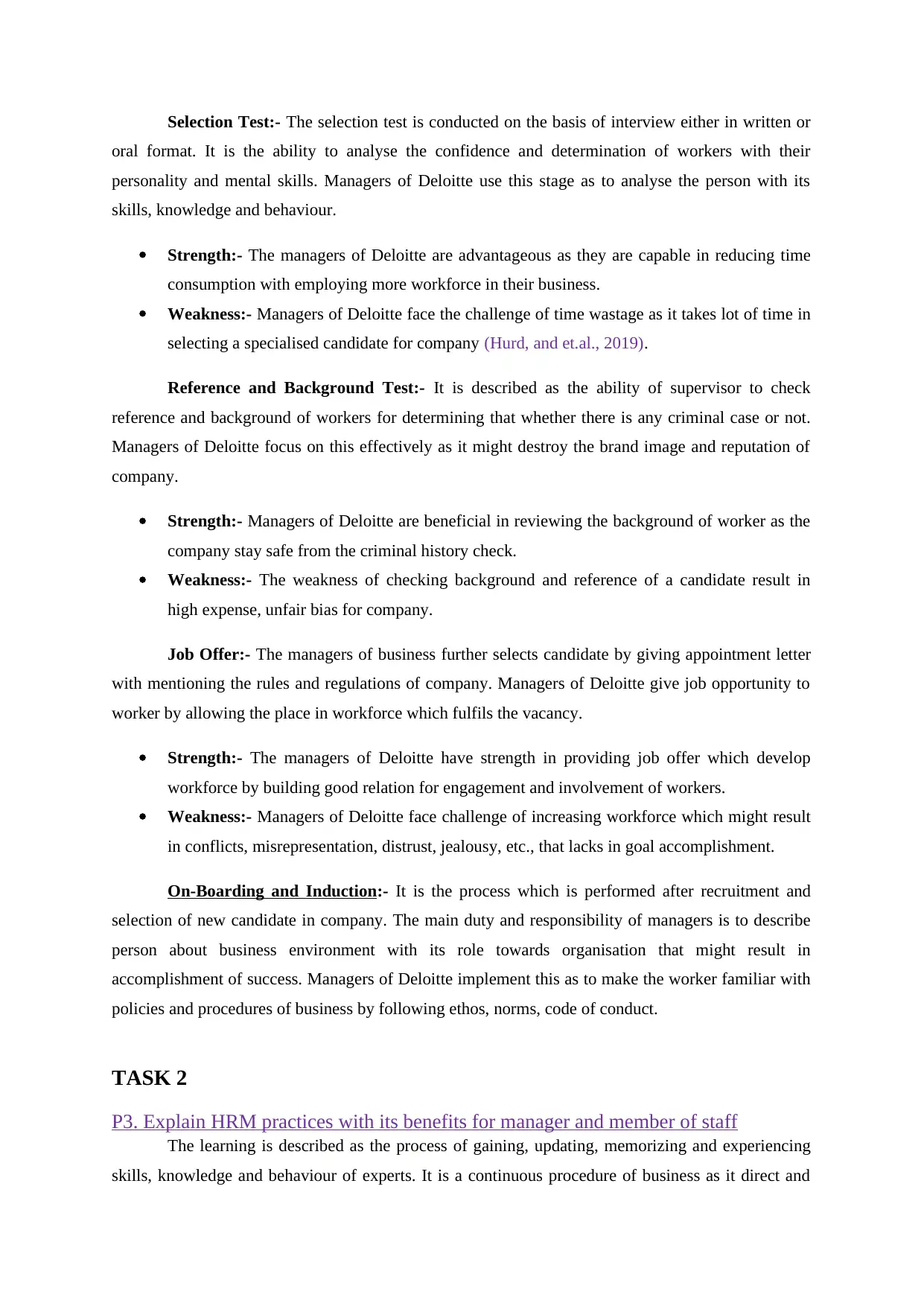
Selection Test:- The selection test is conducted on the basis of interview either in written or
oral format. It is the ability to analyse the confidence and determination of workers with their
personality and mental skills. Managers of Deloitte use this stage as to analyse the person with its
skills, knowledge and behaviour.
Strength:- The managers of Deloitte are advantageous as they are capable in reducing time
consumption with employing more workforce in their business.
Weakness:- Managers of Deloitte face the challenge of time wastage as it takes lot of time in
selecting a specialised candidate for company (Hurd, and et.al., 2019).
Reference and Background Test:- It is described as the ability of supervisor to check
reference and background of workers for determining that whether there is any criminal case or not.
Managers of Deloitte focus on this effectively as it might destroy the brand image and reputation of
company.
Strength:- Managers of Deloitte are beneficial in reviewing the background of worker as the
company stay safe from the criminal history check.
Weakness:- The weakness of checking background and reference of a candidate result in
high expense, unfair bias for company.
Job Offer:- The managers of business further selects candidate by giving appointment letter
with mentioning the rules and regulations of company. Managers of Deloitte give job opportunity to
worker by allowing the place in workforce which fulfils the vacancy.
Strength:- The managers of Deloitte have strength in providing job offer which develop
workforce by building good relation for engagement and involvement of workers.
Weakness:- Managers of Deloitte face challenge of increasing workforce which might result
in conflicts, misrepresentation, distrust, jealousy, etc., that lacks in goal accomplishment.
On-Boarding and Induction:- It is the process which is performed after recruitment and
selection of new candidate in company. The main duty and responsibility of managers is to describe
person about business environment with its role towards organisation that might result in
accomplishment of success. Managers of Deloitte implement this as to make the worker familiar with
policies and procedures of business by following ethos, norms, code of conduct.
TASK 2
P3. Explain HRM practices with its benefits for manager and member of staff
The learning is described as the process of gaining, updating, memorizing and experiencing
skills, knowledge and behaviour of experts. It is a continuous procedure of business as it direct and
oral format. It is the ability to analyse the confidence and determination of workers with their
personality and mental skills. Managers of Deloitte use this stage as to analyse the person with its
skills, knowledge and behaviour.
Strength:- The managers of Deloitte are advantageous as they are capable in reducing time
consumption with employing more workforce in their business.
Weakness:- Managers of Deloitte face the challenge of time wastage as it takes lot of time in
selecting a specialised candidate for company (Hurd, and et.al., 2019).
Reference and Background Test:- It is described as the ability of supervisor to check
reference and background of workers for determining that whether there is any criminal case or not.
Managers of Deloitte focus on this effectively as it might destroy the brand image and reputation of
company.
Strength:- Managers of Deloitte are beneficial in reviewing the background of worker as the
company stay safe from the criminal history check.
Weakness:- The weakness of checking background and reference of a candidate result in
high expense, unfair bias for company.
Job Offer:- The managers of business further selects candidate by giving appointment letter
with mentioning the rules and regulations of company. Managers of Deloitte give job opportunity to
worker by allowing the place in workforce which fulfils the vacancy.
Strength:- The managers of Deloitte have strength in providing job offer which develop
workforce by building good relation for engagement and involvement of workers.
Weakness:- Managers of Deloitte face challenge of increasing workforce which might result
in conflicts, misrepresentation, distrust, jealousy, etc., that lacks in goal accomplishment.
On-Boarding and Induction:- It is the process which is performed after recruitment and
selection of new candidate in company. The main duty and responsibility of managers is to describe
person about business environment with its role towards organisation that might result in
accomplishment of success. Managers of Deloitte implement this as to make the worker familiar with
policies and procedures of business by following ethos, norms, code of conduct.
TASK 2
P3. Explain HRM practices with its benefits for manager and member of staff
The learning is described as the process of gaining, updating, memorizing and experiencing
skills, knowledge and behaviour of experts. It is a continuous procedure of business as it direct and
⊘ This is a preview!⊘
Do you want full access?
Subscribe today to unlock all pages.

Trusted by 1+ million students worldwide
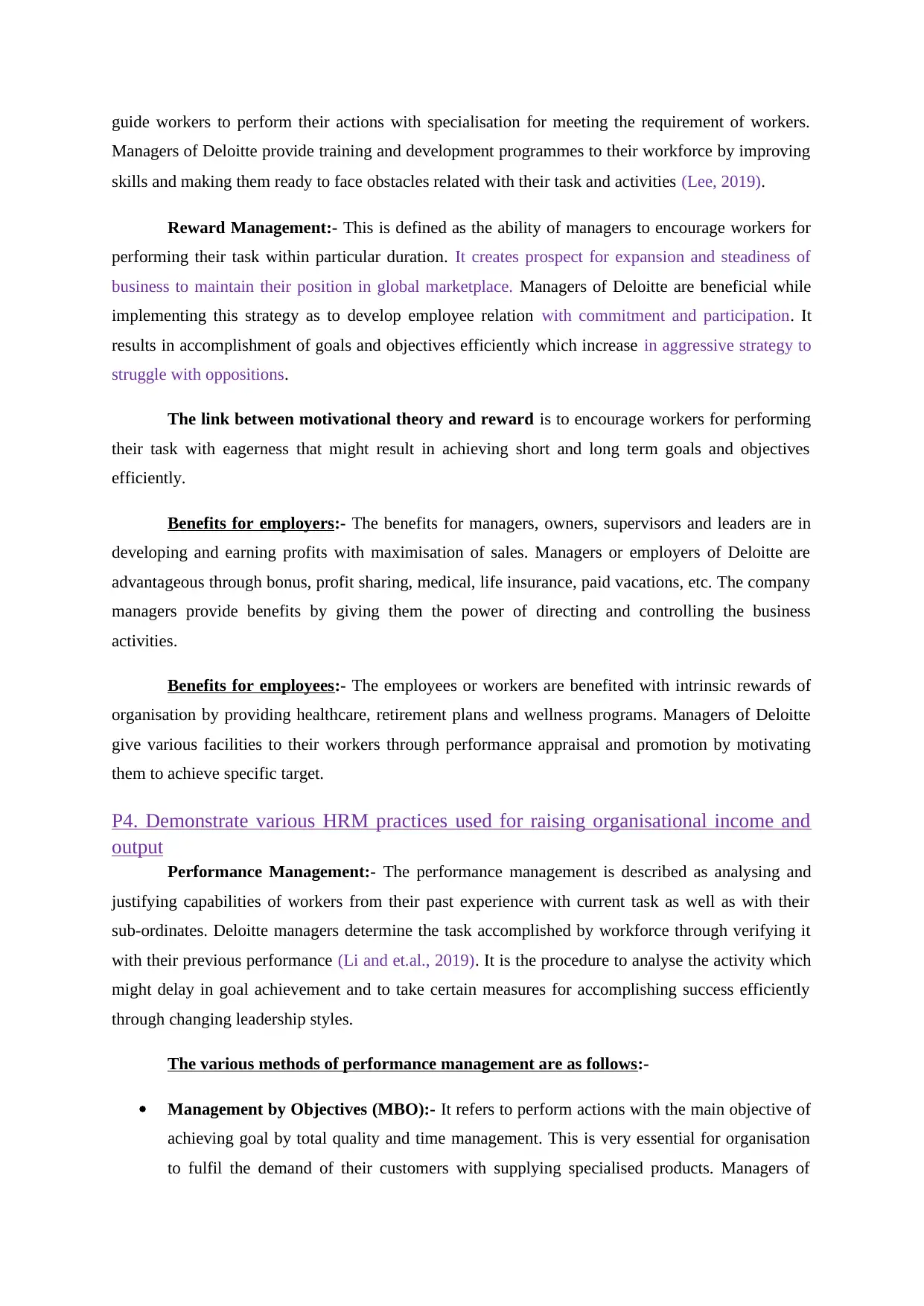
guide workers to perform their actions with specialisation for meeting the requirement of workers.
Managers of Deloitte provide training and development programmes to their workforce by improving
skills and making them ready to face obstacles related with their task and activities (Lee, 2019).
Reward Management:- This is defined as the ability of managers to encourage workers for
performing their task within particular duration. It creates prospect for expansion and steadiness of
business to maintain their position in global marketplace. Managers of Deloitte are beneficial while
implementing this strategy as to develop employee relation with commitment and participation. It
results in accomplishment of goals and objectives efficiently which increase in aggressive strategy to
struggle with oppositions.
The link between motivational theory and reward is to encourage workers for performing
their task with eagerness that might result in achieving short and long term goals and objectives
efficiently.
Benefits for employers:- The benefits for managers, owners, supervisors and leaders are in
developing and earning profits with maximisation of sales. Managers or employers of Deloitte are
advantageous through bonus, profit sharing, medical, life insurance, paid vacations, etc. The company
managers provide benefits by giving them the power of directing and controlling the business
activities.
Benefits for employees:- The employees or workers are benefited with intrinsic rewards of
organisation by providing healthcare, retirement plans and wellness programs. Managers of Deloitte
give various facilities to their workers through performance appraisal and promotion by motivating
them to achieve specific target.
P4. Demonstrate various HRM practices used for raising organisational income and
output
Performance Management:- The performance management is described as analysing and
justifying capabilities of workers from their past experience with current task as well as with their
sub-ordinates. Deloitte managers determine the task accomplished by workforce through verifying it
with their previous performance (Li and et.al., 2019). It is the procedure to analyse the activity which
might delay in goal achievement and to take certain measures for accomplishing success efficiently
through changing leadership styles.
The various methods of performance management are as follows:-
Management by Objectives (MBO):- It refers to perform actions with the main objective of
achieving goal by total quality and time management. This is very essential for organisation
to fulfil the demand of their customers with supplying specialised products. Managers of
Managers of Deloitte provide training and development programmes to their workforce by improving
skills and making them ready to face obstacles related with their task and activities (Lee, 2019).
Reward Management:- This is defined as the ability of managers to encourage workers for
performing their task within particular duration. It creates prospect for expansion and steadiness of
business to maintain their position in global marketplace. Managers of Deloitte are beneficial while
implementing this strategy as to develop employee relation with commitment and participation. It
results in accomplishment of goals and objectives efficiently which increase in aggressive strategy to
struggle with oppositions.
The link between motivational theory and reward is to encourage workers for performing
their task with eagerness that might result in achieving short and long term goals and objectives
efficiently.
Benefits for employers:- The benefits for managers, owners, supervisors and leaders are in
developing and earning profits with maximisation of sales. Managers or employers of Deloitte are
advantageous through bonus, profit sharing, medical, life insurance, paid vacations, etc. The company
managers provide benefits by giving them the power of directing and controlling the business
activities.
Benefits for employees:- The employees or workers are benefited with intrinsic rewards of
organisation by providing healthcare, retirement plans and wellness programs. Managers of Deloitte
give various facilities to their workers through performance appraisal and promotion by motivating
them to achieve specific target.
P4. Demonstrate various HRM practices used for raising organisational income and
output
Performance Management:- The performance management is described as analysing and
justifying capabilities of workers from their past experience with current task as well as with their
sub-ordinates. Deloitte managers determine the task accomplished by workforce through verifying it
with their previous performance (Li and et.al., 2019). It is the procedure to analyse the activity which
might delay in goal achievement and to take certain measures for accomplishing success efficiently
through changing leadership styles.
The various methods of performance management are as follows:-
Management by Objectives (MBO):- It refers to perform actions with the main objective of
achieving goal by total quality and time management. This is very essential for organisation
to fulfil the demand of their customers with supplying specialised products. Managers of
Paraphrase This Document
Need a fresh take? Get an instant paraphrase of this document with our AI Paraphraser
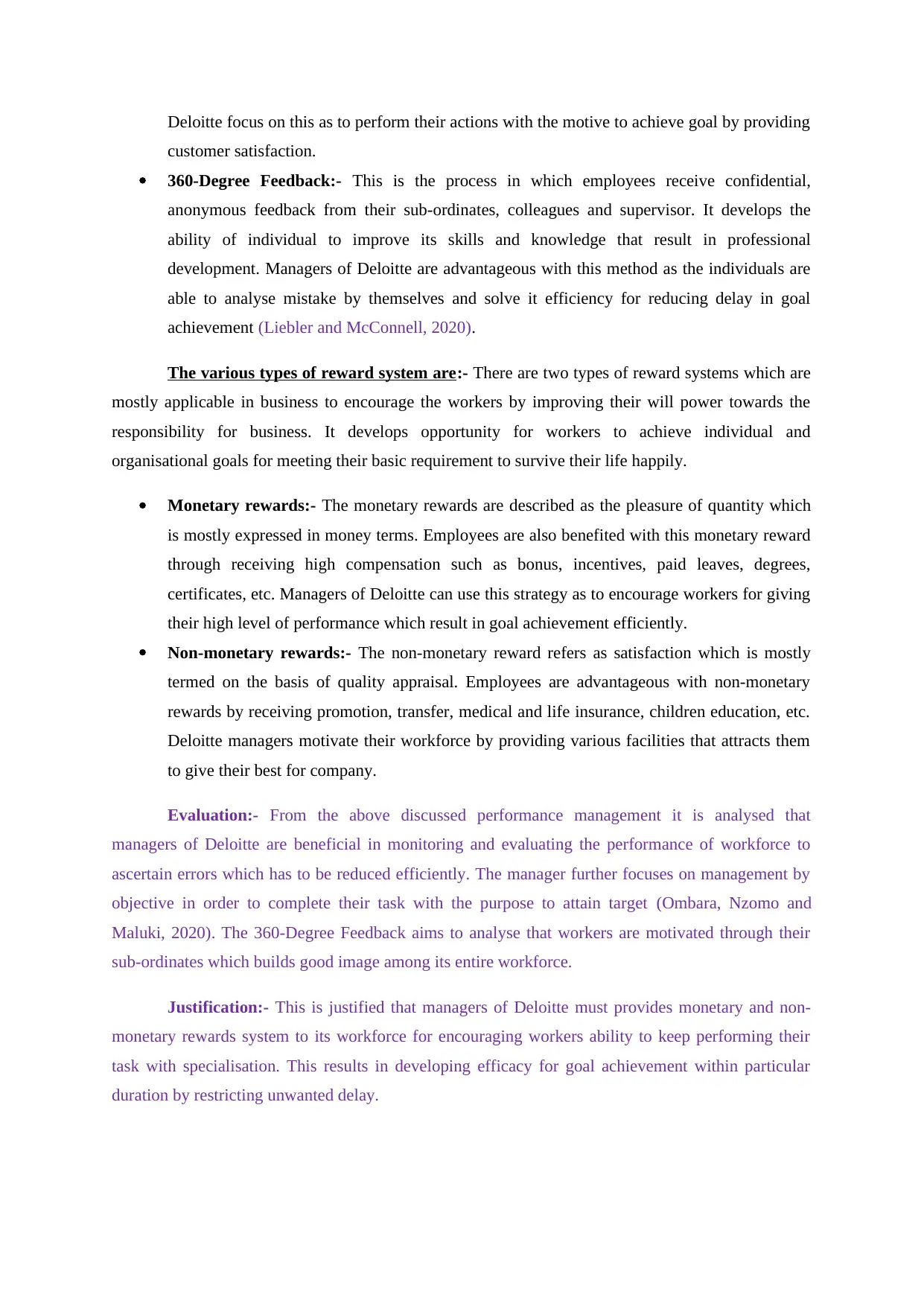
Deloitte focus on this as to perform their actions with the motive to achieve goal by providing
customer satisfaction.
360-Degree Feedback:- This is the process in which employees receive confidential,
anonymous feedback from their sub-ordinates, colleagues and supervisor. It develops the
ability of individual to improve its skills and knowledge that result in professional
development. Managers of Deloitte are advantageous with this method as the individuals are
able to analyse mistake by themselves and solve it efficiency for reducing delay in goal
achievement (Liebler and McConnell, 2020).
The various types of reward system are:- There are two types of reward systems which are
mostly applicable in business to encourage the workers by improving their will power towards the
responsibility for business. It develops opportunity for workers to achieve individual and
organisational goals for meeting their basic requirement to survive their life happily.
Monetary rewards:- The monetary rewards are described as the pleasure of quantity which
is mostly expressed in money terms. Employees are also benefited with this monetary reward
through receiving high compensation such as bonus, incentives, paid leaves, degrees,
certificates, etc. Managers of Deloitte can use this strategy as to encourage workers for giving
their high level of performance which result in goal achievement efficiently.
Non-monetary rewards:- The non-monetary reward refers as satisfaction which is mostly
termed on the basis of quality appraisal. Employees are advantageous with non-monetary
rewards by receiving promotion, transfer, medical and life insurance, children education, etc.
Deloitte managers motivate their workforce by providing various facilities that attracts them
to give their best for company.
Evaluation:- From the above discussed performance management it is analysed that
managers of Deloitte are beneficial in monitoring and evaluating the performance of workforce to
ascertain errors which has to be reduced efficiently. The manager further focuses on management by
objective in order to complete their task with the purpose to attain target (Ombara, Nzomo and
Maluki, 2020). The 360-Degree Feedback aims to analyse that workers are motivated through their
sub-ordinates which builds good image among its entire workforce.
Justification:- This is justified that managers of Deloitte must provides monetary and non-
monetary rewards system to its workforce for encouraging workers ability to keep performing their
task with specialisation. This results in developing efficacy for goal achievement within particular
duration by restricting unwanted delay.
customer satisfaction.
360-Degree Feedback:- This is the process in which employees receive confidential,
anonymous feedback from their sub-ordinates, colleagues and supervisor. It develops the
ability of individual to improve its skills and knowledge that result in professional
development. Managers of Deloitte are advantageous with this method as the individuals are
able to analyse mistake by themselves and solve it efficiency for reducing delay in goal
achievement (Liebler and McConnell, 2020).
The various types of reward system are:- There are two types of reward systems which are
mostly applicable in business to encourage the workers by improving their will power towards the
responsibility for business. It develops opportunity for workers to achieve individual and
organisational goals for meeting their basic requirement to survive their life happily.
Monetary rewards:- The monetary rewards are described as the pleasure of quantity which
is mostly expressed in money terms. Employees are also benefited with this monetary reward
through receiving high compensation such as bonus, incentives, paid leaves, degrees,
certificates, etc. Managers of Deloitte can use this strategy as to encourage workers for giving
their high level of performance which result in goal achievement efficiently.
Non-monetary rewards:- The non-monetary reward refers as satisfaction which is mostly
termed on the basis of quality appraisal. Employees are advantageous with non-monetary
rewards by receiving promotion, transfer, medical and life insurance, children education, etc.
Deloitte managers motivate their workforce by providing various facilities that attracts them
to give their best for company.
Evaluation:- From the above discussed performance management it is analysed that
managers of Deloitte are beneficial in monitoring and evaluating the performance of workforce to
ascertain errors which has to be reduced efficiently. The manager further focuses on management by
objective in order to complete their task with the purpose to attain target (Ombara, Nzomo and
Maluki, 2020). The 360-Degree Feedback aims to analyse that workers are motivated through their
sub-ordinates which builds good image among its entire workforce.
Justification:- This is justified that managers of Deloitte must provides monetary and non-
monetary rewards system to its workforce for encouraging workers ability to keep performing their
task with specialisation. This results in developing efficacy for goal achievement within particular
duration by restricting unwanted delay.
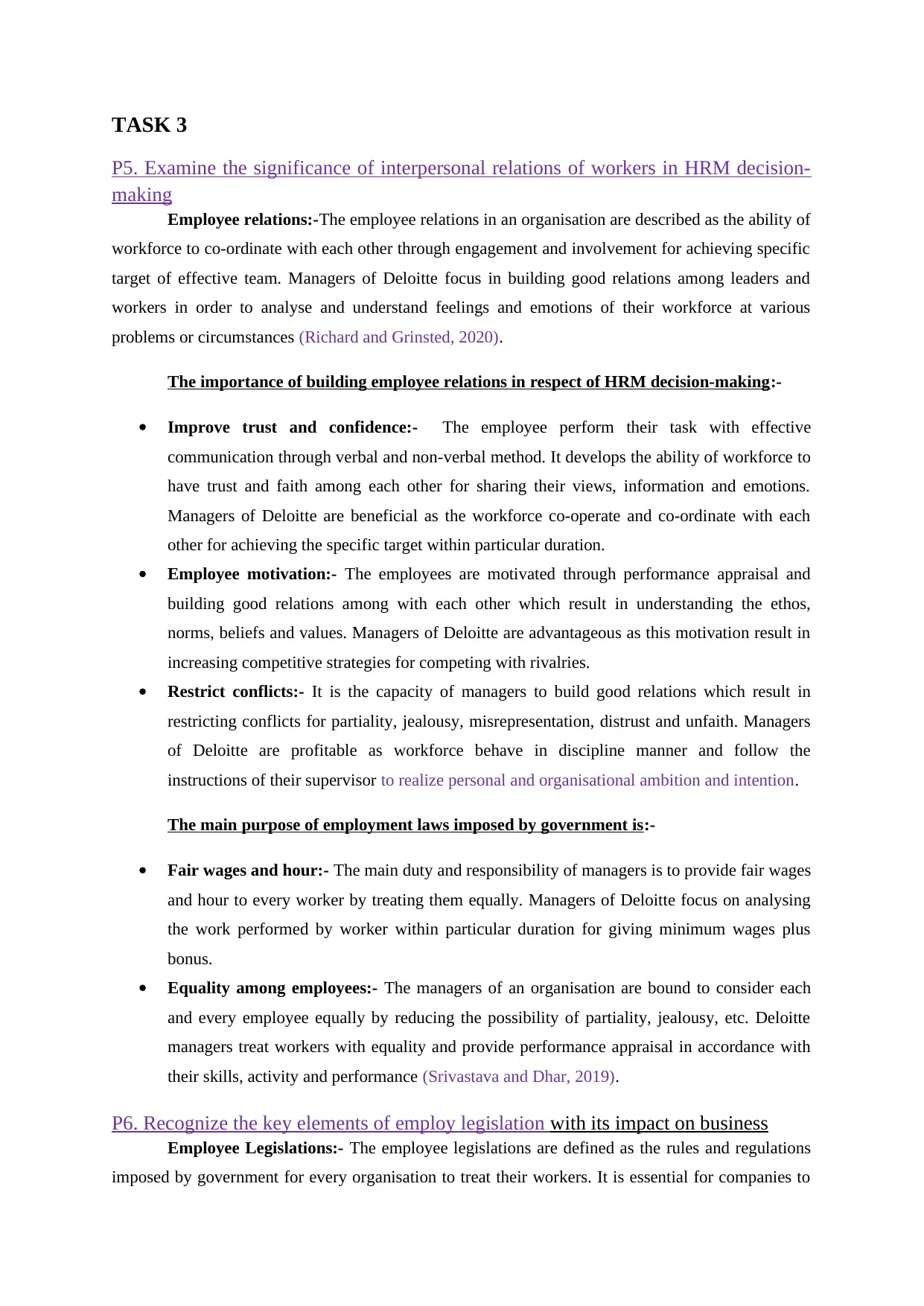
TASK 3
P5. Examine the significance of interpersonal relations of workers in HRM decision-
making
Employee relations:-The employee relations in an organisation are described as the ability of
workforce to co-ordinate with each other through engagement and involvement for achieving specific
target of effective team. Managers of Deloitte focus in building good relations among leaders and
workers in order to analyse and understand feelings and emotions of their workforce at various
problems or circumstances (Richard and Grinsted, 2020).
The importance of building employee relations in respect of HRM decision-making:-
Improve trust and confidence:- The employee perform their task with effective
communication through verbal and non-verbal method. It develops the ability of workforce to
have trust and faith among each other for sharing their views, information and emotions.
Managers of Deloitte are beneficial as the workforce co-operate and co-ordinate with each
other for achieving the specific target within particular duration.
Employee motivation:- The employees are motivated through performance appraisal and
building good relations among with each other which result in understanding the ethos,
norms, beliefs and values. Managers of Deloitte are advantageous as this motivation result in
increasing competitive strategies for competing with rivalries.
Restrict conflicts:- It is the capacity of managers to build good relations which result in
restricting conflicts for partiality, jealousy, misrepresentation, distrust and unfaith. Managers
of Deloitte are profitable as workforce behave in discipline manner and follow the
instructions of their supervisor to realize personal and organisational ambition and intention.
The main purpose of employment laws imposed by government is:-
Fair wages and hour:- The main duty and responsibility of managers is to provide fair wages
and hour to every worker by treating them equally. Managers of Deloitte focus on analysing
the work performed by worker within particular duration for giving minimum wages plus
bonus.
Equality among employees:- The managers of an organisation are bound to consider each
and every employee equally by reducing the possibility of partiality, jealousy, etc. Deloitte
managers treat workers with equality and provide performance appraisal in accordance with
their skills, activity and performance (Srivastava and Dhar, 2019).
P6. Recognize the key elements of employ legislation with its impact on business
Employee Legislations:- The employee legislations are defined as the rules and regulations
imposed by government for every organisation to treat their workers. It is essential for companies to
P5. Examine the significance of interpersonal relations of workers in HRM decision-
making
Employee relations:-The employee relations in an organisation are described as the ability of
workforce to co-ordinate with each other through engagement and involvement for achieving specific
target of effective team. Managers of Deloitte focus in building good relations among leaders and
workers in order to analyse and understand feelings and emotions of their workforce at various
problems or circumstances (Richard and Grinsted, 2020).
The importance of building employee relations in respect of HRM decision-making:-
Improve trust and confidence:- The employee perform their task with effective
communication through verbal and non-verbal method. It develops the ability of workforce to
have trust and faith among each other for sharing their views, information and emotions.
Managers of Deloitte are beneficial as the workforce co-operate and co-ordinate with each
other for achieving the specific target within particular duration.
Employee motivation:- The employees are motivated through performance appraisal and
building good relations among with each other which result in understanding the ethos,
norms, beliefs and values. Managers of Deloitte are advantageous as this motivation result in
increasing competitive strategies for competing with rivalries.
Restrict conflicts:- It is the capacity of managers to build good relations which result in
restricting conflicts for partiality, jealousy, misrepresentation, distrust and unfaith. Managers
of Deloitte are profitable as workforce behave in discipline manner and follow the
instructions of their supervisor to realize personal and organisational ambition and intention.
The main purpose of employment laws imposed by government is:-
Fair wages and hour:- The main duty and responsibility of managers is to provide fair wages
and hour to every worker by treating them equally. Managers of Deloitte focus on analysing
the work performed by worker within particular duration for giving minimum wages plus
bonus.
Equality among employees:- The managers of an organisation are bound to consider each
and every employee equally by reducing the possibility of partiality, jealousy, etc. Deloitte
managers treat workers with equality and provide performance appraisal in accordance with
their skills, activity and performance (Srivastava and Dhar, 2019).
P6. Recognize the key elements of employ legislation with its impact on business
Employee Legislations:- The employee legislations are defined as the rules and regulations
imposed by government for every organisation to treat their workers. It is essential for companies to
⊘ This is a preview!⊘
Do you want full access?
Subscribe today to unlock all pages.

Trusted by 1+ million students worldwide
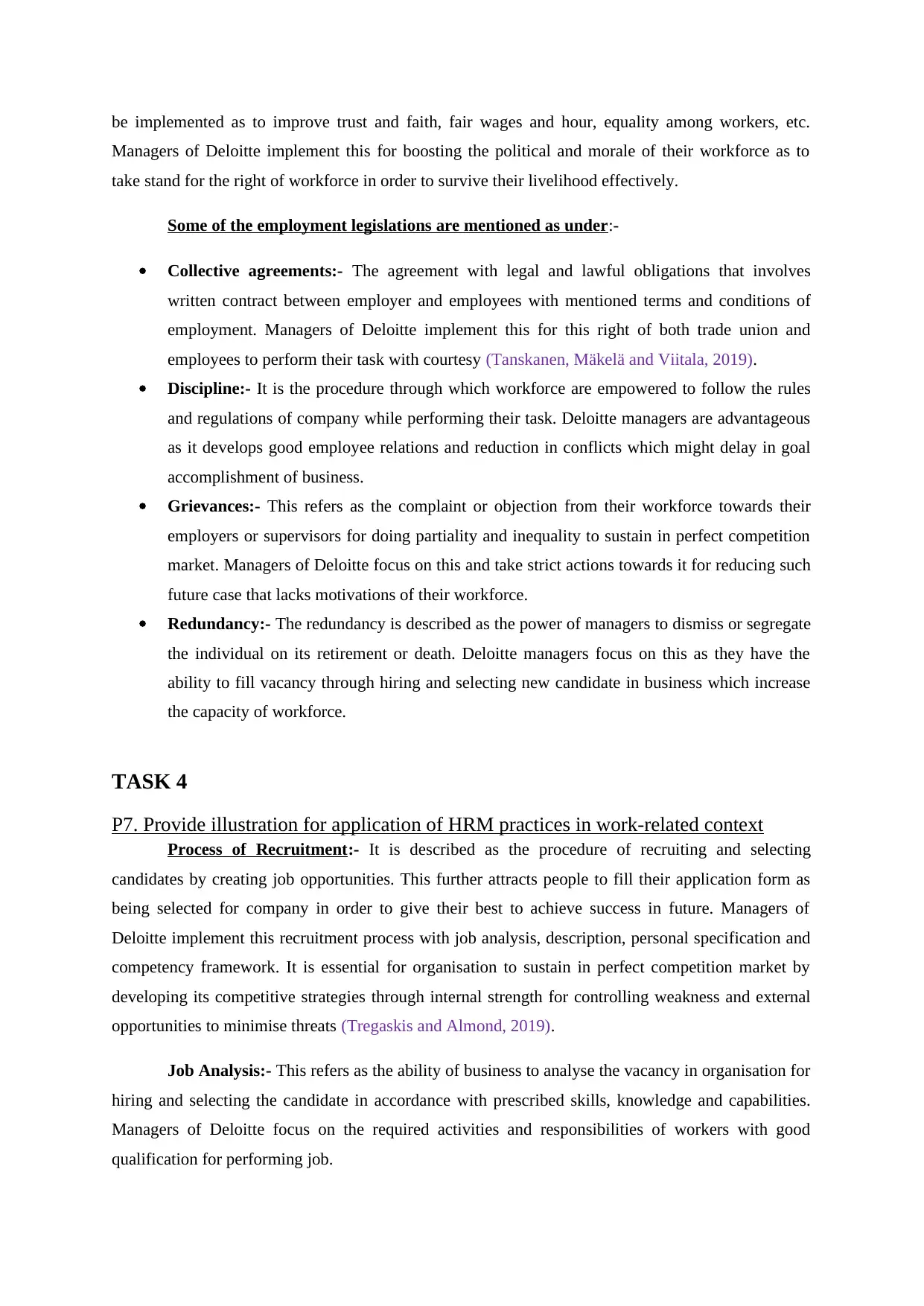
be implemented as to improve trust and faith, fair wages and hour, equality among workers, etc.
Managers of Deloitte implement this for boosting the political and morale of their workforce as to
take stand for the right of workforce in order to survive their livelihood effectively.
Some of the employment legislations are mentioned as under:-
Collective agreements:- The agreement with legal and lawful obligations that involves
written contract between employer and employees with mentioned terms and conditions of
employment. Managers of Deloitte implement this for this right of both trade union and
employees to perform their task with courtesy (Tanskanen, Mäkelä and Viitala, 2019).
Discipline:- It is the procedure through which workforce are empowered to follow the rules
and regulations of company while performing their task. Deloitte managers are advantageous
as it develops good employee relations and reduction in conflicts which might delay in goal
accomplishment of business.
Grievances:- This refers as the complaint or objection from their workforce towards their
employers or supervisors for doing partiality and inequality to sustain in perfect competition
market. Managers of Deloitte focus on this and take strict actions towards it for reducing such
future case that lacks motivations of their workforce.
Redundancy:- The redundancy is described as the power of managers to dismiss or segregate
the individual on its retirement or death. Deloitte managers focus on this as they have the
ability to fill vacancy through hiring and selecting new candidate in business which increase
the capacity of workforce.
TASK 4
P7. Provide illustration for application of HRM practices in work-related context
Process of Recruitment:- It is described as the procedure of recruiting and selecting
candidates by creating job opportunities. This further attracts people to fill their application form as
being selected for company in order to give their best to achieve success in future. Managers of
Deloitte implement this recruitment process with job analysis, description, personal specification and
competency framework. It is essential for organisation to sustain in perfect competition market by
developing its competitive strategies through internal strength for controlling weakness and external
opportunities to minimise threats (Tregaskis and Almond, 2019).
Job Analysis:- This refers as the ability of business to analyse the vacancy in organisation for
hiring and selecting the candidate in accordance with prescribed skills, knowledge and capabilities.
Managers of Deloitte focus on the required activities and responsibilities of workers with good
qualification for performing job.
Managers of Deloitte implement this for boosting the political and morale of their workforce as to
take stand for the right of workforce in order to survive their livelihood effectively.
Some of the employment legislations are mentioned as under:-
Collective agreements:- The agreement with legal and lawful obligations that involves
written contract between employer and employees with mentioned terms and conditions of
employment. Managers of Deloitte implement this for this right of both trade union and
employees to perform their task with courtesy (Tanskanen, Mäkelä and Viitala, 2019).
Discipline:- It is the procedure through which workforce are empowered to follow the rules
and regulations of company while performing their task. Deloitte managers are advantageous
as it develops good employee relations and reduction in conflicts which might delay in goal
accomplishment of business.
Grievances:- This refers as the complaint or objection from their workforce towards their
employers or supervisors for doing partiality and inequality to sustain in perfect competition
market. Managers of Deloitte focus on this and take strict actions towards it for reducing such
future case that lacks motivations of their workforce.
Redundancy:- The redundancy is described as the power of managers to dismiss or segregate
the individual on its retirement or death. Deloitte managers focus on this as they have the
ability to fill vacancy through hiring and selecting new candidate in business which increase
the capacity of workforce.
TASK 4
P7. Provide illustration for application of HRM practices in work-related context
Process of Recruitment:- It is described as the procedure of recruiting and selecting
candidates by creating job opportunities. This further attracts people to fill their application form as
being selected for company in order to give their best to achieve success in future. Managers of
Deloitte implement this recruitment process with job analysis, description, personal specification and
competency framework. It is essential for organisation to sustain in perfect competition market by
developing its competitive strategies through internal strength for controlling weakness and external
opportunities to minimise threats (Tregaskis and Almond, 2019).
Job Analysis:- This refers as the ability of business to analyse the vacancy in organisation for
hiring and selecting the candidate in accordance with prescribed skills, knowledge and capabilities.
Managers of Deloitte focus on the required activities and responsibilities of workers with good
qualification for performing job.
Paraphrase This Document
Need a fresh take? Get an instant paraphrase of this document with our AI Paraphraser
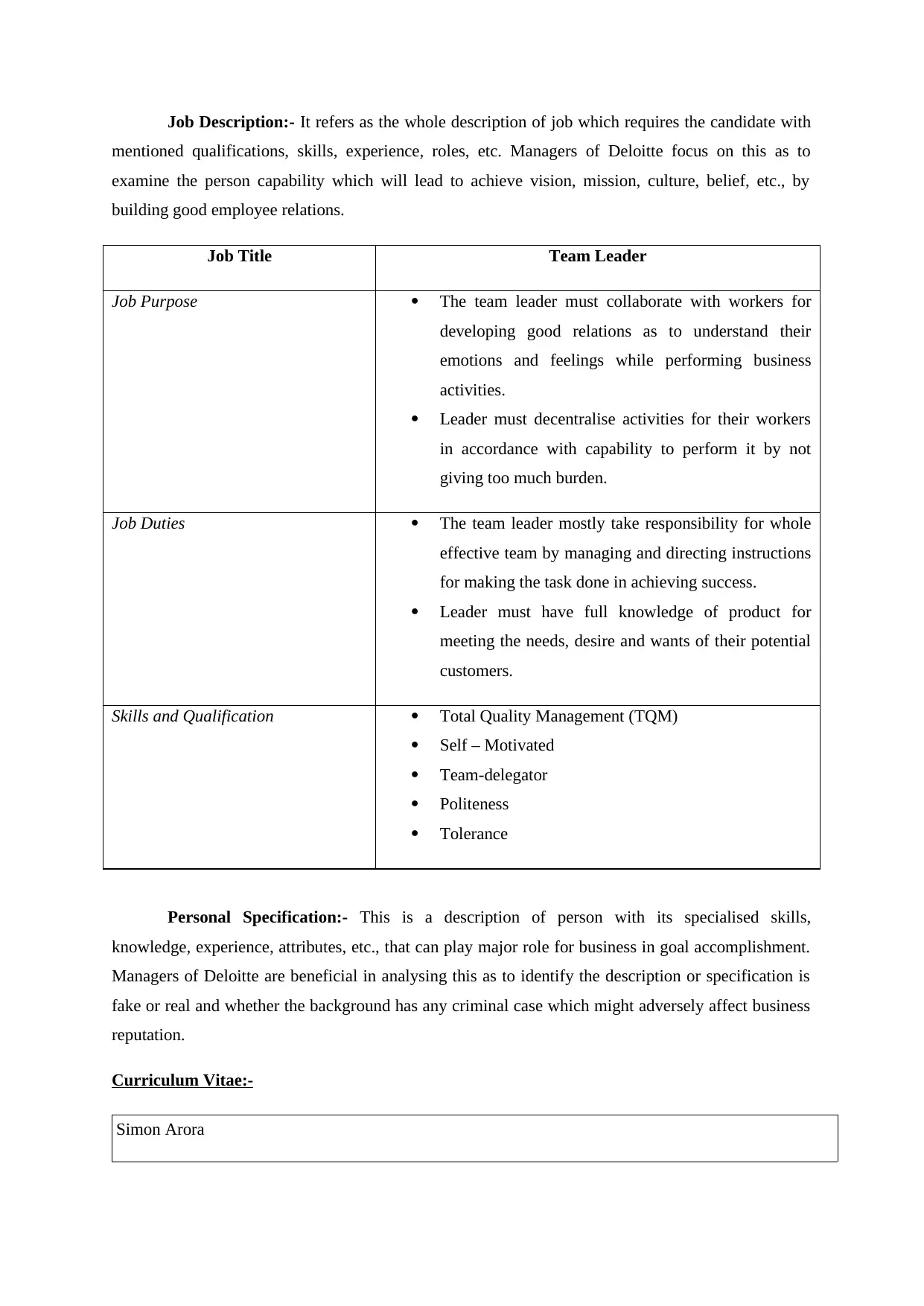
Job Description:- It refers as the whole description of job which requires the candidate with
mentioned qualifications, skills, experience, roles, etc. Managers of Deloitte focus on this as to
examine the person capability which will lead to achieve vision, mission, culture, belief, etc., by
building good employee relations.
Job Title Team Leader
Job Purpose The team leader must collaborate with workers for
developing good relations as to understand their
emotions and feelings while performing business
activities.
Leader must decentralise activities for their workers
in accordance with capability to perform it by not
giving too much burden.
Job Duties The team leader mostly take responsibility for whole
effective team by managing and directing instructions
for making the task done in achieving success.
Leader must have full knowledge of product for
meeting the needs, desire and wants of their potential
customers.
Skills and Qualification Total Quality Management (TQM)
Self – Motivated
Team-delegator
Politeness
Tolerance
Personal Specification:- This is a description of person with its specialised skills,
knowledge, experience, attributes, etc., that can play major role for business in goal accomplishment.
Managers of Deloitte are beneficial in analysing this as to identify the description or specification is
fake or real and whether the background has any criminal case which might adversely affect business
reputation.
Curriculum Vitae:-
Simon Arora
mentioned qualifications, skills, experience, roles, etc. Managers of Deloitte focus on this as to
examine the person capability which will lead to achieve vision, mission, culture, belief, etc., by
building good employee relations.
Job Title Team Leader
Job Purpose The team leader must collaborate with workers for
developing good relations as to understand their
emotions and feelings while performing business
activities.
Leader must decentralise activities for their workers
in accordance with capability to perform it by not
giving too much burden.
Job Duties The team leader mostly take responsibility for whole
effective team by managing and directing instructions
for making the task done in achieving success.
Leader must have full knowledge of product for
meeting the needs, desire and wants of their potential
customers.
Skills and Qualification Total Quality Management (TQM)
Self – Motivated
Team-delegator
Politeness
Tolerance
Personal Specification:- This is a description of person with its specialised skills,
knowledge, experience, attributes, etc., that can play major role for business in goal accomplishment.
Managers of Deloitte are beneficial in analysing this as to identify the description or specification is
fake or real and whether the background has any criminal case which might adversely affect business
reputation.
Curriculum Vitae:-
Simon Arora
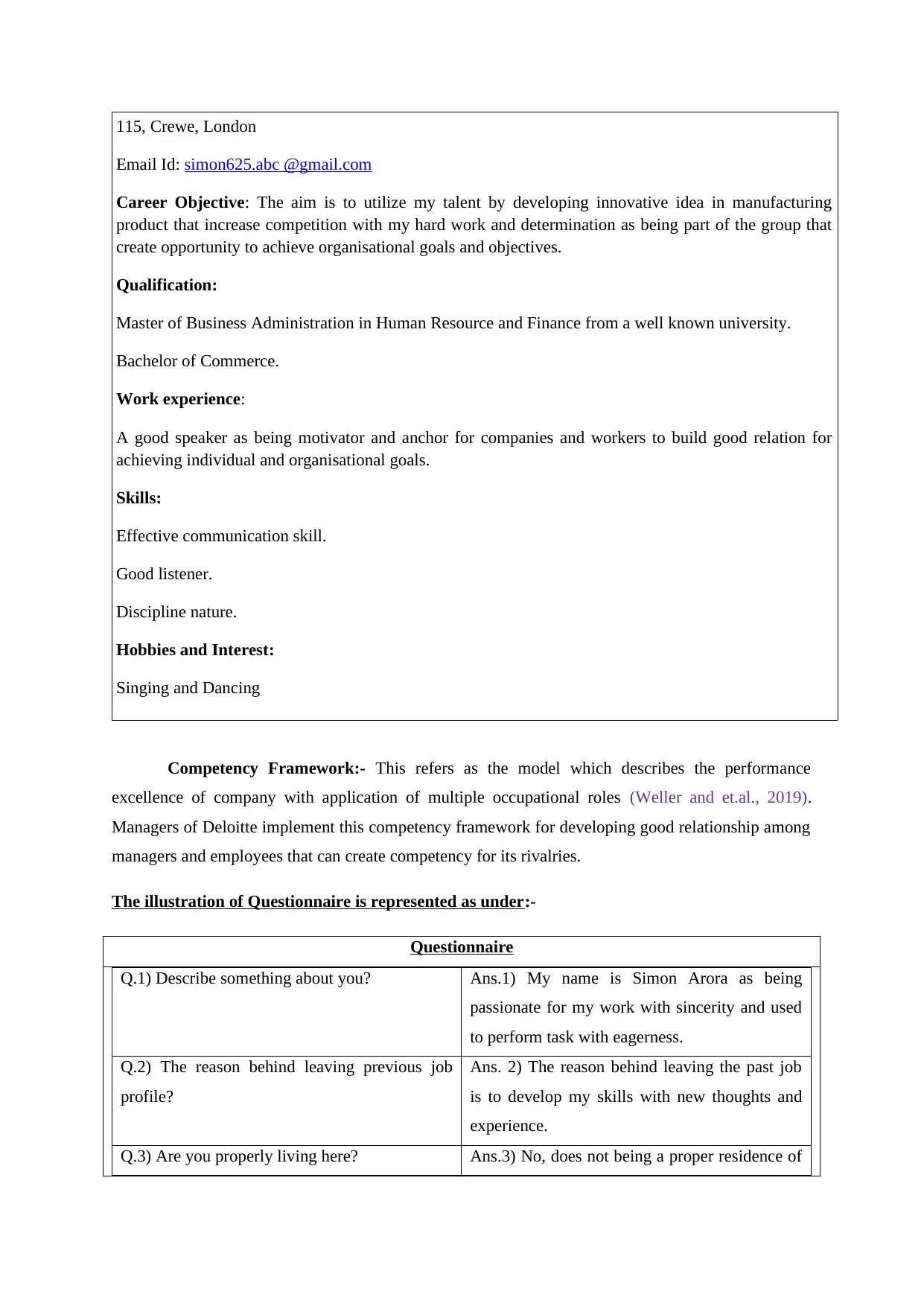
115, Crewe, London
Email Id: simon625.abc @gmail.com
Career Objective: The aim is to utilize my talent by developing innovative idea in manufacturing
product that increase competition with my hard work and determination as being part of the group that
create opportunity to achieve organisational goals and objectives.
Qualification:
Master of Business Administration in Human Resource and Finance from a well known university.
Bachelor of Commerce.
Work experience:
A good speaker as being motivator and anchor for companies and workers to build good relation for
achieving individual and organisational goals.
Skills:
Effective communication skill.
Good listener.
Discipline nature.
Hobbies and Interest:
Singing and Dancing
Competency Framework:- This refers as the model which describes the performance
excellence of company with application of multiple occupational roles (Weller and et.al., 2019).
Managers of Deloitte implement this competency framework for developing good relationship among
managers and employees that can create competency for its rivalries.
The illustration of Questionnaire is represented as under:-
Questionnaire
Q.1) Describe something about you? Ans.1) My name is Simon Arora as being
passionate for my work with sincerity and used
to perform task with eagerness.
Q.2) The reason behind leaving previous job
profile?
Ans. 2) The reason behind leaving the past job
is to develop my skills with new thoughts and
experience.
Q.3) Are you properly living here? Ans.3) No, does not being a proper residence of
Email Id: simon625.abc @gmail.com
Career Objective: The aim is to utilize my talent by developing innovative idea in manufacturing
product that increase competition with my hard work and determination as being part of the group that
create opportunity to achieve organisational goals and objectives.
Qualification:
Master of Business Administration in Human Resource and Finance from a well known university.
Bachelor of Commerce.
Work experience:
A good speaker as being motivator and anchor for companies and workers to build good relation for
achieving individual and organisational goals.
Skills:
Effective communication skill.
Good listener.
Discipline nature.
Hobbies and Interest:
Singing and Dancing
Competency Framework:- This refers as the model which describes the performance
excellence of company with application of multiple occupational roles (Weller and et.al., 2019).
Managers of Deloitte implement this competency framework for developing good relationship among
managers and employees that can create competency for its rivalries.
The illustration of Questionnaire is represented as under:-
Questionnaire
Q.1) Describe something about you? Ans.1) My name is Simon Arora as being
passionate for my work with sincerity and used
to perform task with eagerness.
Q.2) The reason behind leaving previous job
profile?
Ans. 2) The reason behind leaving the past job
is to develop my skills with new thoughts and
experience.
Q.3) Are you properly living here? Ans.3) No, does not being a proper residence of
⊘ This is a preview!⊘
Do you want full access?
Subscribe today to unlock all pages.

Trusted by 1+ million students worldwide
1 out of 14
Related Documents
Your All-in-One AI-Powered Toolkit for Academic Success.
+13062052269
info@desklib.com
Available 24*7 on WhatsApp / Email
![[object Object]](/_next/static/media/star-bottom.7253800d.svg)
Unlock your academic potential
Copyright © 2020–2026 A2Z Services. All Rights Reserved. Developed and managed by ZUCOL.





